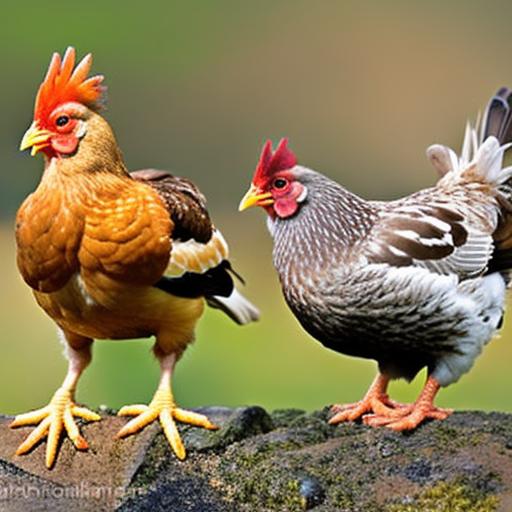Keeping chickens in your backyard can be a rewarding and fulfilling experience. Not only do they provide you with fresh eggs, but they also offer natural pest control and fertilizer for your garden. Chickens are low-maintenance pets that can bring joy and entertainment to your life. In this article, we will explore the various aspects of keeping chickens, from understanding their needs to choosing the right breed and providing them with a safe and secure environment.
Key Takeaways
- Keeping chickens has many benefits, including fresh eggs, natural pest control, and fertilizer for your garden.
- Before getting chickens, it’s important to research and understand their needs, including space requirements and breed selection.
- Two chickens require at least 10 square feet of space and a secure coop to protect them from predators.
- Choosing the right breed depends on your needs, such as egg production or temperament.
- Feeding and watering your chickens is important for their health and well-being, and keeping them safe and secure is crucial.
- The cost of keeping chickens includes initial setup and ongoing expenses for food and supplies.
- Keeping chickens can also provide social benefits, such as a sense of community and connection with nature.
- Overall, the joy of keeping chickens is a rewarding experience that can enhance your life in many ways.
The Importance of Researching Before Getting Chickens
Before you decide to get chickens, it is crucial to do your research. This includes familiarizing yourself with local laws and regulations regarding chicken-keeping, as well as any zoning requirements or homeowner association rules that may apply to your area. Some cities have restrictions on the number of chickens you can keep or may require permits. It is essential to ensure that you are in compliance with these regulations before bringing chickens into your backyard.
Understanding the Needs of Chickens
Chickens have basic needs that must be met for them to thrive. These include shelter, food, water, and space to roam. A chicken coop provides protection from predators and the elements, while also serving as a place for chickens to lay their eggs. The coop should be well-ventilated, secure, and easy to clean. Chickens also require a balanced diet consisting of commercial feed supplemented with kitchen scraps and fresh greens. Clean water should always be available to them.
The Space Requirements for Two Chickens
If you are planning to keep just two chickens, you will need to provide them with adequate space both inside the coop and outside in a run or fenced area. The coop should have at least 4 square feet of floor space per chicken, while the run should have at least 10 square feet per chicken. It is important to remember that chickens need space to move around and engage in natural behaviors such as scratching and dust bathing. Providing them with enough space will ensure their well-being and prevent overcrowding.
Choosing the Right Breed for Your Needs
There are many different breeds of chickens, each with its own characteristics and qualities. When choosing a breed, consider factors such as egg-laying ability, temperament, and cold-hardiness. If you are primarily interested in fresh eggs, breeds such as Rhode Island Reds or Leghorns are excellent choices. If you have children or want chickens that are friendly and docile, consider breeds like Silkies or Orpingtons. It is also important to consider the climate in your area and choose a breed that is well-suited to the local weather conditions.
Feeding and Watering Your Chickens

Feeding your chickens a balanced diet is essential for their health and productivity. Commercial chicken feed is readily available and provides all the necessary nutrients. You can also supplement their diet with kitchen scraps such as vegetable peelings, fruit scraps, and bread. However, it is important to avoid feeding them anything toxic or harmful, such as chocolate or onions. Clean water should always be available to your chickens, and it should be changed regularly to prevent contamination.
Keeping Your Chickens Safe and Secure
Keeping your chickens safe from predators and disease is crucial for their well-being. The coop should be secure, with sturdy walls and a predator-proof roof. The run or fenced area should also be secure, with buried wire mesh to prevent digging predators from gaining access. Regularly inspect the coop and run for any signs of damage or weakness that could compromise their safety. Additionally, practice good biosecurity measures to prevent the spread of diseases by keeping the coop clean and disinfecting it regularly.
The Cost of Keeping Chickens
While keeping chickens can be relatively inexpensive compared to other pets, there are still costs involved. The initial cost includes building or buying a coop, purchasing feeders and waterers, and acquiring the chickens themselves. Ongoing costs include purchasing feed and supplies, as well as veterinary care if needed. It is important to budget for these expenses and ensure that you can afford to provide for your chickens’ needs before bringing them into your backyard.
The Social Benefits of Keeping Chickens
In addition to the practical benefits, keeping chickens can also have social benefits. For families with children, chickens can teach responsibility and provide a hands-on learning experience about where food comes from. Chickens can also be a source of entertainment and companionship, as they have unique personalities and behaviors that can be fascinating to observe. Many chicken owners find that spending time with their chickens is a calming and therapeutic experience.
The Joy of Keeping Chickens
Keeping chickens in your backyard can bring numerous benefits, from fresh eggs to natural pest control and fertilizer for your garden. However, it is important to do your research and understand the needs of chickens before getting them. Providing them with adequate shelter, space, food, and water is essential for their well-being. Choosing the right breed for your needs and keeping them safe from predators and disease are also crucial. While there are costs involved in keeping chickens, the social benefits and joy they bring to your life make it all worthwhile. Consider adding chickens to your backyard flock and enjoy the many rewards they offer.
If you’re considering keeping chickens in your garden, you may also be interested in learning about the importance of a well-designed chicken coop and nest box. A properly constructed coop and nest box not only provide a safe and comfortable space for your chickens but also encourage healthy egg-laying habits. To find out more about creating the perfect chicken coop and nest box, check out this informative article on poultrywizard.com.
FAQs
Can you keep 2 chickens?
Yes, you can keep 2 chickens as pets or for egg production. However, it is important to consider the space, housing, and care requirements for the chickens.
How much space do 2 chickens need?
Two chickens need at least 10 square feet of space in their coop and 20 square feet of space in their outdoor run. It is important to provide enough space for them to move around comfortably and exercise.
What kind of housing do 2 chickens need?
Two chickens need a secure and predator-proof coop with proper ventilation, nesting boxes, and roosting bars. The coop should also have a run attached to it or a separate outdoor run for the chickens to roam around in during the day.
What do 2 chickens eat?
Chickens need a balanced diet of chicken feed, which can be supplemented with kitchen scraps, fruits, and vegetables. They also need access to clean water at all times.
Do 2 chickens need a rooster to lay eggs?
No, hens can lay eggs without a rooster. However, if you want fertilized eggs to hatch into chicks, you will need a rooster.
What are the benefits of keeping 2 chickens?
Keeping 2 chickens can provide a source of fresh eggs, entertainment, and companionship. Chickens are also great for pest control and can help fertilize your garden.
Meet Walter, the feathered-friend fanatic of Florida! Nestled in the sunshine state, Walter struts through life with his feathered companions, clucking his way to happiness. With a coop that’s fancier than a five-star hotel, he’s the Don Juan of the chicken world. When he’s not teaching his hens to do the cha-cha, you’ll find him in a heated debate with his prized rooster, Sir Clucks-a-Lot. Walter’s poultry passion is no yolk; he’s the sunny-side-up guy you never knew you needed in your flock of friends!







